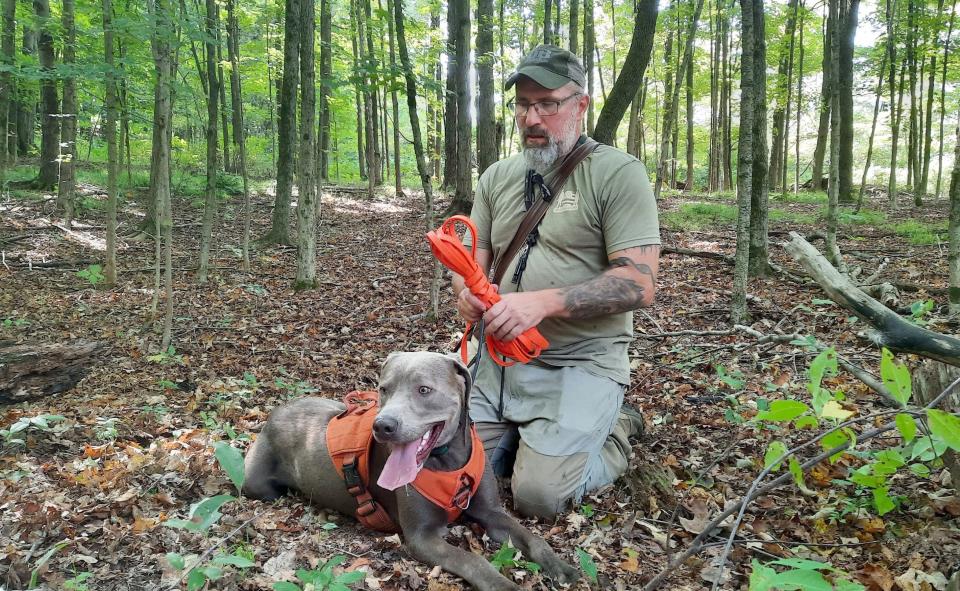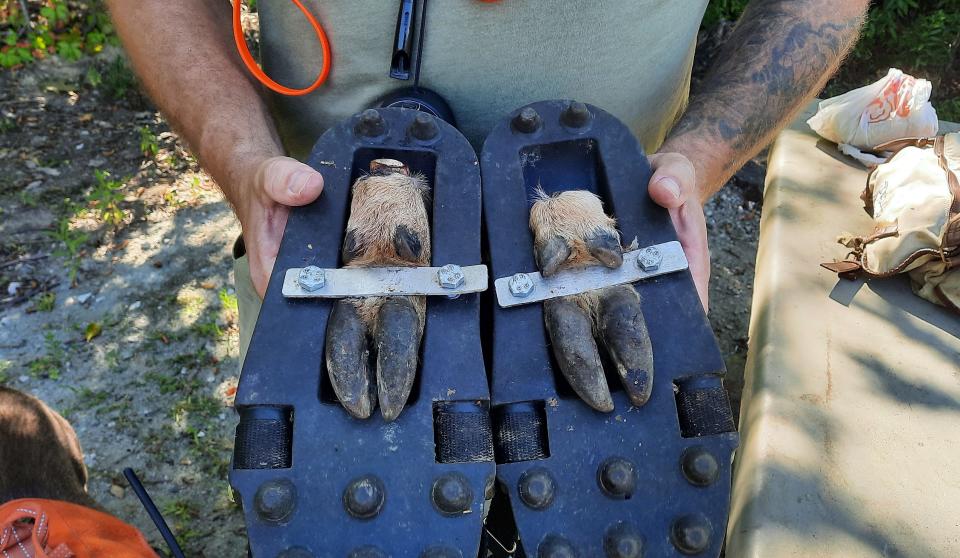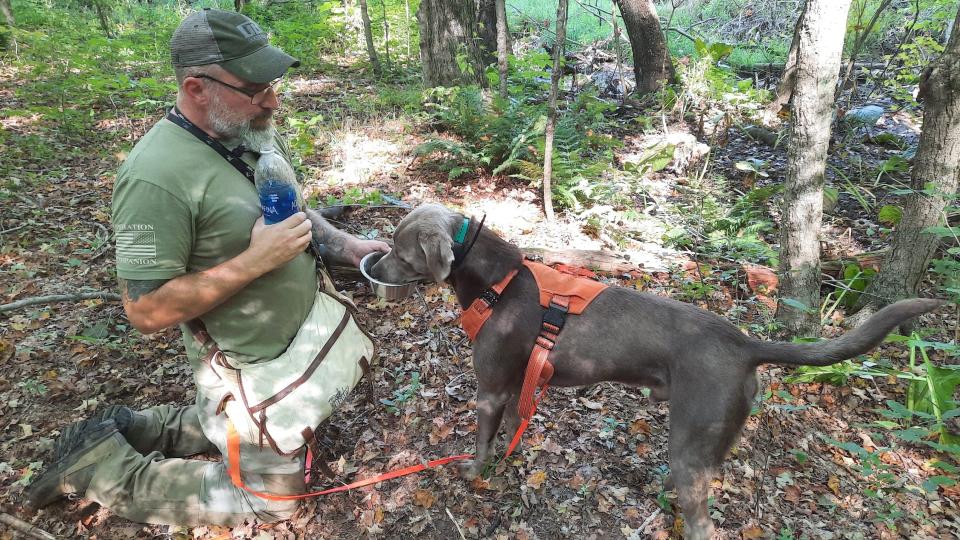A dog may become a deer hunter's best friend this fall. Here's why
Helping others recover their deer has become a passion for a life-long outdoorsman.
Michael Beck, 49, Jerome, Somerset County, has a dog, Dexter, that’s trained to follow the scent of a wounded deer. Working together, Dexter, a silver Labrador retriever is able to find deer that may otherwise not be found by sportsmen and women.

Beck is part of a network of dog handlers, United Blood Trackers, who are available to hunters across the state. Beck is also affiliated with Blood Tracking Dogs LLC in Maryland. Beck has a strong Facebook and Instagram presence @ Dexter the Deer Dog for people to contact him or follow their tracking efforts. “I’m just a guy with a really cool dog who’s out there to help people,” he said.
Beck’s interest in getting a deer-tracking dog stemmed from an archery hunt he had in November 2021. A buck of a lifetime responded to him rattling antlers. He took the shot, but it wasn’t a fatal wound and the deer was never found.
“It was the second buck of my lifetime that I hit like that and didn’t recover. This one was something special,” he said about never seeing a deer that size before.
His heart sank and he prayed for guidance as to how to make something good out of this gut-wrenching experience. Three days later, he decided to get a dog to help himself and others find their trophies, and Dexter the Deer Dog concept began.
What are the dog-tracking rules in Pa.?
Leashed dogs can be used in Pennsylvania to track a white-tailed deer, bear or elk that have been legally killed or wounded during any open hunting season. No permit is required but the tracker is required to have the proper hunting license for the quarry.
“As hunters, we emphasize taking only good shots that quickly and cleanly harvest game. Part of the reason for this is to ensure we recover game, and bring it from field to table, making good use of this renewable, natural resource,” Travis Lau, communications director for the Pennsylvania Game Commission, said through email.
“While many deer that are lethally shot are relatively easy to track and recover, others are more challenging, especially in instances where visible sign is sparse. That’s where tracking dogs can be especially beneficial, because they can follow a track even if we can’t see it, and can lead a hunter directly to an expired deer that otherwise might not be found despite the effort put in to search for it. Any hunter who ever has failed to recover a deer they hit and wounded knows the sickening feeling that goes along with not knowing whether the deer lived or died. Tracking dogs can help answer those questions, bring closure, and in some cases, turn bad outcomes into good ones,” Lau said.
Carson Gross, 21, of Somerset is one of the hunters who has appreciated having a dog to help find a deer.
Last archery season, he shot a 10-point that he tracked about 80 yards before losing the trail. A friend referred him to Beck to help.
“Dexter picked up on the trail pretty quickly and I watched him work his magic,” Gross said.
“Without Dexter there’s no way I would have found that buck,” he said. The deer ran along a field leaving little sign, making it difficult for a human to follow.
“It was a really cool experience watching (Dexter) work. He had his head down and went on a beeline.,” Gross explained.
Beck’s been interested in hunting since he was a boy. “I started at age 12,” he said about squirrel hunting with his grandfather. He soon started deer hunting. Last fall is the first deer season he’s worked with other hunters to find their deer.
“He’s a family dog first,” Beck said about why he chose a Labrador for his household. Finding deer for hunters starts in mid-September and ends in mid-January, less than half a year. “He’s my son’s buddy and my couch potato family dog 365 days a year. That never stops. So what’s more important?” Beck said.
Dexter's deer-tracking training
Beck studied how to teach a dog to track deer by attending a workshop in Pulaski, Wisconsin, with Jeremy Moore, who operates DogBone Hunter. “He’s an awesome guy,” he said about the resources that Moore makes available.
“He’s eager to work,” Beck said about Dexter already helping with finding lost livestock and pets.
“It’s very rewarding, it’s very humbling training a dog because they will definitely show you your mistakes,” he said.
“But then the reward, when you see everything come together, there’s nothing like it.”

When they are tracking deer, the dog is always on a long leash to help control the situation. “Even if Pennsylvania would allow it, I don’t want him to be off lead. That’s taking me out of the equation and solely depending on my dog. Plus you don’t know what your dog is going to run into,” Beck said.
“It’s my responsibility to keep him safe. Without the leash I can’t do that,” he said.
They work as a team, but Beck said handlers need to trust their dogs' instincts. “He taught me real quick to trust him and to read him,” he said about following the scent.
Are you ready?: Why does this deer expert think Pennsylvania hunters are in for banner seasons?
Sometimes the person may think a deer ran one way, but the dog knows it went a different way.
The dogs are trained to follow the scent a deer leaves from the gland between the hooves. When a deer is stressed it makes a unique scent that allows the dog to follow that deer instead of others that are in the area.
“It’s real neat to watch,” Beck said how the dog will work to find the scent especially when the deer makes 90-degree turns.

When to call for a tracking dog
Beck said you can call him to talk about your deer and what may have happened. He can provide a calm, objective, experienced voice about your shot and what to do next. The more information you can provide the tracker regarding how the deer responded, the better chances that person will have of knowing the outcome.
“I don’t want to be known as the guy who is always finding trophy bucks. Every deer is a trophy. I want to find that yearling doe as much as I do a 150-inch buck. I want to find a six-point as much as a 130 (inch rack.)”
Beck sets his fees based on how far he has to travel to get to where the person is hunting. Locally his rates start out at $100 to help cover his costs as well as to help pay for Dexter's ongoing expenses.
“I try to keep everything reasonable,” Beck said about what hunters end up paying for his and Dexter’s services. It’s important for hunters to know that dog trackers do this as they have time away from their regular jobs and family.
“A lot of us wish we could track every animal, but it’s not feasible,” Beck said. The tracker will be asking many questions about what happened after the shot, what types of sign were present and will be able to offer the hunter some good advice about the expectations.
“We’re not here to judge you, we’ve all been there,” he said.
Tips for recovering your deer
Patient is a virtue. One of the mistakes hunters make is not giving the deer time to expire. If you track a deer too soon, it could jump up and run further. Depending on where the deer was hit, you may need to wait several hours before tracking it.
“Most of the tracks we run into are from the overexcited individual,” Beck said about needing to be patient.
“The one thing you can control is yourself,” he said about the recovery effort.
“I like when hunters call me from the tree (stand),” he said about talking hunters through what happened and how to proceed based on what happened.
A common mistake hunters make is grid searching. Beck said when hunters walk in a grid pattern, they may step on the deer’s trail and then carry that scent off the actual trail. If they cross the trail several times, it creates an extra challenge for the dog to follow the scent.
A steadier rest: Deer hunting revolution? A Pa. man's patent-pending shooting rail updates the tree stand
Why he helps others
“I’ve always been a public servant,” Beck said about his life which included running with fire and ambulance departments, serving in the Navy and working at a prison.
Finding deer for hunters is rewarding to him. “When people call you, they can be at one of their lowest points. Their animal, their trophy that they wanted to harvest is potentially gone forever. It’s a bad feeling for a sportsman. It’s gut-wrenching. When they call us they are at that point.”
A tracker is not going to find every deer, but Beck said he enjoys it when they are successful.
"To see those people go from way down low to bringing them up to their celebration is emotional for me," he said. "I love it. I’m totally invested in helping people. There’s not enough of us out there."
Brian Whipkey is the outdoors columnist for USA TODAY Network sites in Pennsylvania. Contact him at bwhipkey@gannett.com and sign up for our weekly Go Outdoors PA newsletter email on this website's homepage under your login name. Follow him on Facebook @whipkeyoutdoors, X @whipkeyoutdoors and Instagram at whipkeyoutdoors.
This article originally appeared on The Daily American: Deer-tracking dogs in Pennsylvania

